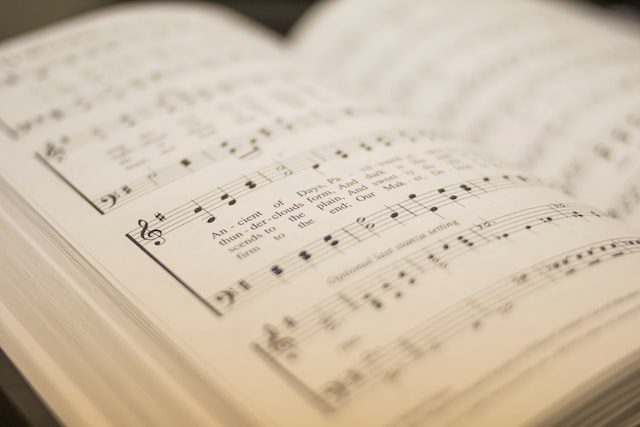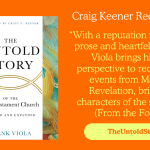In response to my recent series of posts on hymns I’d like to ban for all etenity, someone asked me to talk more about what hymns I would never want to block. Rather than a list of what I think are the best, which would be difficult and unnecessarily subjective, I thought I would list some general criteria for the kind of hymns I find most valuable.
First and foremost, I believe that music should serve the liturgy of the church. In some churches, where there are commitments to good historic liturgy, following the church calendar, and Holy Scripture, this task is pretty straightforward. In churches without these things, hymnody might be the only sort of liturgical expression the people have. In either case, choosing what the congregation sings is important, perhaps more than ever. Many people are in churches that never sing anything worth remembering, whether it be pop worship songs or bad contemporary hymnody. In addition, people who still consider themselves churchgoing Christians attend with less regularity than in the past. I want those people to encounter hymnody that is worth remembering, and will edify them spiritually.
It may seem trite, but now that I’m a parent, I find that I cannot escape considering what I would want my own children singing. Which hymns do I want entrenched in their earliest memories of singing in church? Which hymns do I want them to encounter with enough repetition that they become part of their spiritual formation? Which hymns do I want them to take with them in the coming seasons of their life? Time is short. There are only so many Sundays I have with them as children. Only three of four hymns each Sunday. Do I really want to waste many of those on “Lord of the Dance?”
Here’s what I came up with.
Hymns of Praise That Speak to God’s Character
It should be obvious, but good hymns testify to the transcendent character of Almighty God as revealed in Scripture, and call the church to join in his praise. An overarching theme of worship is that God is God, and we are not. Great hymns remind us of this, and set our minds on God’s greatness.
A mighty fortress is our God,
a bulwark never failing;
our helper he, amid the flood
of mortal ills prevailing.
Hymns That Proclaim the Gospel
I want them to sing hymns that talk about the love of Christ as shown through his redemptive work. Christ crucified for sinners is the greatest theme the human voice could possibly sing.
Lo, the Good Shepherd for the sheep is offered;
the slave hath sinned, and the Son hath suffered;
for our atonement, while we nothing heeded,
God interceded.
Hymns That Draw from Holy Scripture
Great hymns don’t apologize or cloud the truth of Holy Scripture, nor do they seek to make it more palatable to modern ears. Some of the greatest hymns are simply Scripture in poetic form. Take the wonderful hymns of Isaac Watts, for instance.
Before the hills in order stood,
or earth received its frame,
from everlasting you are God,
to endless years the same.
Hymns That Teach Good Theology
The hymnal is many things. One of those things is a theological textbook. (I think I said this in a post a long time ago…) Choose hymns that teach the truths of the Christian faith strongly and beautifully.
He left His Father’s throne above,
So free, so infinite His grace;
Emptied Himself of all but love,
And bled for Adam’s helpless race;
‘Tis mercy all, immense and free;
For, O my God, it found out me.
Hymns With a Low Anthropology
Again, God is God, and we are not. There is a tendency in modern hymnwriting to make too much out of human ability, insight, and will (See also: Sing a New World Into Being, et al.). This is, in part, a high anthropology; it is the notion that, if all external factors are removed, humans can choose to be good and well-behaved, and can turn the world into a nice place. I want to sing hymns that, instead, follow the biblical and orthodox understanding of humanity as fallen, helpless to save themselves, and fully in need of God’s grace.
The dying thief rejoiced to see
That fountain in his day;
And there may I, though vile as he,
Wash all my sins away.
Hymns That Faithfully Portray the Church’s Mission
There are a lot of hymns that reside under the categorical umbrella of “mission” that aren’t very good. Some feature a high anthropology, begging the church for quixotic efforts to make the world more just and nice. Others fail to connect the mission to the Gospel, instead preaching substitutes like social action. Others are nothing but thinly veiled – or overt – pieces of political propaganda. So start by asking, “What is the church’s mission?” I would argue, in light of the Great Commission, it is to make disciples. That’s where it starts.
Proclaim to every people, tongue, and nation
that God, in whom they live and move, is Love;
tell how he stooped to save his lost creation,
and died on earth that man might live above.
Hymns That Are Beautiful
There are a number of hymns that have some good things to say, but the poetry is so awful it gets in the way. Part of the problem is that while, for the older hymnwriters, good poetry was a part of their culture, it no longer is. The ability to craft poetic verse in a beautiful nuanced way must be developed. While some old hymns are not shining examples of poetic prowess, there are few modern hymnwriters who can write even passably beautiful poetry. Here’s an example of some great theology set in great poetry:
Manifest at Jordan’s stream,
Prophet, Priest, and King supreme,
and at Cana, wedding guest,
in your Godhead manifest;
manifest in pow’r divine,
changing water into wine.
Anthems be to you addressed,
God in man made manifest.
There are many examples of these kinds of hymns. Some are rich theological treasures. Others more simple and stark. Again, the main concern should be whether the hymn is really worth singing, knowing, and committing to memory. Is it true? Does it edify? Does it have enough meat on it to sustain us? Does it give us a realistic view of God, his kingdom, Christ’s work on our behalf, and humanity? If the answer to these is “no,” then perhaps it won’t do us any good at all, and maybe we should choose something else.
Photo: unsplash.com











